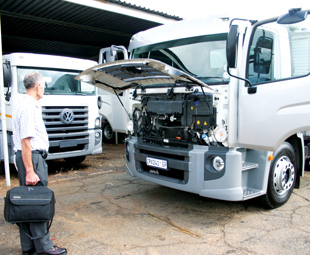Viewing Vic

The musician Jimi Hendrix said “knowledge speaks, but wisdom listens”. Celebrating half a century in the commercial vehicle industry this year, Vic Oliver is knowledge personified. It’s wise to listen when he speaks – and it’s a treat to let his own life story do the talking. JACO DE KLERK pays tribute to this exceptional individual on behalf of the entire FOCUS team.
Few in the commercial vehicle sector can say they haven’t heard of Vic Oliver of Vic Oliver and Associates. This commercial vehicle consultant’s name has become synonymous with vehicle testing, fleet owner consulting and the training of the next generation of sales cadets and executives.
Oliver is an authority on almost anything and everything in the commercial vehicle sphere, his expertise built up over an astonishing period of 50 years. One cannot help but be humbled by his modest disposition – and at the same time enthralled by his passion for the industry. “I became passionate about trucks and buses early in life,” he recollects.
It all began in 1963. “During my last year at school, I was offered a position with the International Harvester company to start the following January,” he says. Oliver accepted the position and arrived to start work as a trainee cadet on January 3, 1963.
It was the beginning of an epic odyssey that would benefit many people in the industry over many years. “The training programme covered a three-year period, with one year in the workshop, one year in the parts department and one year in the sales and administration division,” explains Oliver. He spent seven years with the company marketing International trucks.
Busaf – manufacturer and builder of a complete range of heavy duty truck bodies, trailers, tankers, refuse collection truck bodies and buses – then added Oliver to its team. “I started working for Busaf as a technical sales representative and later progressed to the position of sales manager,” he says.
 In 1981, Oliver was offered a job at another body builder company, F A Poole, and spent seven years marketing its products and managing the company’s sales force. He enrolled to do a one-year Marketing Diploma at the Damelin Management School the same year.
In 1981, Oliver was offered a job at another body builder company, F A Poole, and spent seven years marketing its products and managing the company’s sales force. He enrolled to do a one-year Marketing Diploma at the Damelin Management School the same year.
“After successfully completing my Marketing Diploma, I enrolled at the University of the Witwatersrand, which, together with the Department of Transport, offered a two-year training course in Technical Road Transportation.” This course covered basic engineering, automotive technology and technical transport management.
Oliver’s by now already impressive curriculum vitae was further enhanced when he joined Nissan South Africa as a regional manager for its truck division in 1988. “I spent 14 happy years at Nissan, working as a regional manager and later as national fleet manager,” he says.
With 38 years gaining invaluable experience and knowledge, Oliver left the then Nissan Diesel (present-day UD Trucks) at the end of 2001 to start his own consultancy company – Vic Oliver and Associates.
“There were many highlights in my long career in this tough industry,” he says, “but the one I am most proud of is the success that I have achieved in establishing my own company.” Another highlight of equal importance that he takes great delight in is the knowledge and experience he has been able to pass on to the younger generations of truck sales executives.
His long and distinguished career, which is still being fleshed out, has also delivered countless unforgettable moments. Oliver says the most memorable occurred in the early days of the truck and trailer industry when he sold a cement tanker to one of the biggest construction companies at the time.
“The construction company decided to deal directly with the supplier of the stationary engine and the cement blower fitted to the front of the tanker,” he explains, adding that the blower was used to discharge loose cement powder from the tanker to a bulk cement storage unit located on the construction site.
“On completion of the unit, I decided to have a hand-over ceremony where we would demonstrate the new cement tanker, especially how the cement would be discharged – and invited senior management from both companies to attend.”
He confesses that he didn’t know much about how the unit worked, due to the company’s direct dealings with the supplier, and ordered 50 packs of cement from a local hardware store. The contents were duly emptied into the cement tanker.
“I instructed the workshop to fit a temporary discharge hose from the tanker to an empty 240 litre drum positioned on the ground next to the tanker. All was set, and everyone arrived for the demonstration and hand-over of the new tanker … “
 An important detail to note is that this was a time in history when all senior employees wore dark business suits and ties.
An important detail to note is that this was a time in history when all senior employees wore dark business suits and ties.
“Just as the supplier of the cement blower unit was getting ready to start the engine, I was called to the office to take an urgent overseas phone call.”
On reaching the phone, he looked back into the yard just as the engine was being started. “Within seconds, I saw a white explosion that resembled an atomic cloud.”
A minute or so later – it took that long for the dust to settle – Oliver saw white ghost figures standing around the tanker where the group of men once were. “Their suits and faces were completely covered with cement. They all had to find the nearest shower.”
Fortunately, that was the only damage. It turned out the discharge pressure was far greater than Oliver had anticipated.
“Luckily for me, everyone saw it as a big joke and said I had orchestrated the entire incident. But it was a good lesson to learn, and the memory of the shocked looks on those white-faced ghosts standing around the tanker is something I will always remember.”
Fortunately for the world, Oliver doesn’t spend his time blowing up cement tankers nowadays, with around 60 percent of it spent training truck sales cadets and sales executives, helping them to improve their product knowledge and develop greater marketing skills.
A further 30 percent of his time goes to the consulting of fleet owners, conducting fleet audits and helping them to increase their profit margins. “The remaining ten percent of my time is spent writing articles and road testing commercial vehicles for FOCUS.”
Oliver met FOCUS editor Charleen Clarke at a Christmas function about 10 years ago, when he was establishing his company. “Knowing that I had just left Nissan Diesel and was in the process of starting to work on my own, she invited me to write for FOCUS,” he says. He accepted, writing an article on outsourcing vehicle maintenance, and forwarded the article for comment. “She called me immediately, saying that the article was newsworthy – and asked me to write a monthly column for the magazine.”
The rest, as they say, is history, with Oliver continuing to enlighten FOCUS readers about the latest and most pressing matters in this tough, dynamic, challenging, wonderful industry.
Oliver is truly one of South Africa’s most respected commercial vehicle industry authorities. With the knowledge and wisdom he has gained – and shared – in the past half century, he has earned Rock Star status in my book.
Turn to page six if you skipped the latest of Vic’s Views and get your copy of FOCUS’s annual Transport Manager’s Handbook for his forecast on 2013.
Published by
Focus on Transport
focusmagsa




 !
From 1 Apri
!
From 1 Apri

 Big news from FOCUS on Transport + Logist
Big news from FOCUS on Transport + Logist





 FUSO: Driving the Future of Mobile Healthc
FUSO: Driving the Future of Mobile Healthc



 A brand
A brand




 Wondering about the maximum legal load for a
Wondering about the maximum legal load for a 
 The MAN hTGX powered by a hydrogen combus
The MAN hTGX powered by a hydrogen combus

 Exciting News for South African Operators
Exciting News for South African Operators
